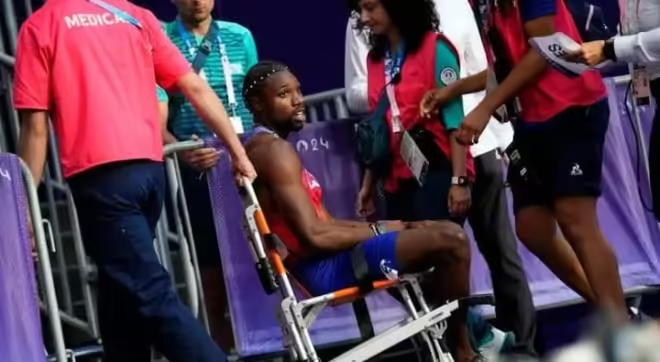
**Before the Men’s 200-Meter Final, Team USA Sprinter Kenny Bednarek Angrily Charges 2024 Olympics Officials of “Favoritism”**
The 2024 Paris Olympics, a stage where athletes showcase not only their physical prowess but also their mental fortitude, has seen its fair share of controversies. One of the most heated incidents leading up to the men’s 200-meter final involved Team USA sprinter Kenny Bednarek, who made headlines after publicly accusing Olympic officials of “favoritism.”
### The Accusation
In the hours leading up to the highly anticipated 200-meter final, Bednarek, known for his explosive speed and consistency on the track, voiced his frustration during a press conference. He claimed that certain decisions made by the Olympic officials were not only questionable but also appeared to be biased in favor of other athletes. The sprinter did not hold back, stating, “I’ve trained my entire life for this moment, and to see the officials bending the rules or giving special treatment to some competitors is not only unfair, but it undermines the integrity of the sport.”
While Bednarek did not specify which athletes he believed were receiving preferential treatment, the context of his remarks suggested that he felt the playing field was not level. His comments immediately sparked a media frenzy, with many speculating that the accusations were directed toward sprinters from other leading nations known for their dominance in the event.
### The Build-Up to the Controversy
The roots of Bednarek’s discontent seemed to lie in a series of decisions that had been made earlier in the Olympic track and field events. Sources close to the sprinter revealed that he was particularly upset about the lane assignments, which he believed were unfairly distributed. Traditionally, in the 200-meter race, lane assignments can significantly impact performance, with middle lanes often considered advantageous. Bednarek, however, was placed in an outer lane, which he felt put him at a distinct disadvantage.
Moreover, Bednarek and his team were reportedly unhappy with the timing of the race schedule, which they felt did not allow him sufficient recovery time between the semifinals and the finals. This, according to Bednarek, was another example of how the organizers were catering to certain athletes, allowing them to perform at their peak while others were left struggling to keep up.
### The Reaction
The reaction to Bednarek’s outburst was swift and polarized. Fellow athletes and coaches were divided in their opinions. Some supported Bednarek’s right to speak out against what he perceived as unfair treatment, while others felt that his accusations were baseless and potentially damaging to the spirit of the competition.
The Olympic officials, for their part, issued a statement denying any favoritism, asserting that all decisions were made in accordance with the rules and with fairness as the priority. They emphasized that the lane assignments were conducted through a standard draw, and the race schedule was designed to be as equitable as possible for all athletes.
### Impact on the Final
As the men’s 200-meter final approached, the atmosphere was tense. Bednarek’s accusations had added an extra layer of drama to an already competitive field. The question on everyone’s mind was whether the controversy would affect Bednarek’s performance or if he could channel his frustration into a medal-winning run.
In the end, the race went ahead as planned, but Bednarek’s accusations of favoritism cast a long shadow over the event. Regardless of the outcome, the controversy highlighted the intense pressures and high stakes at the Olympic Games, where every decision can be scrutinized, and every athlete’s dream hangs in the balance.
As the dust settles, the incident will likely continue to spark debates about fairness, transparency, and the challenges athletes face in the quest for Olympic glory.